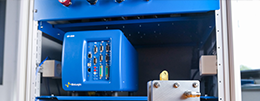Freeze quench.
Accessory to enable the conversion of stopped flow/chemical flow to a freeze quench in minutes
Freeze quench can be used to study full and intermediate kinetics by trapping reaction intermediates, whose presence has been determined by stopped-flow experiments
When chemical quenching is not suitable for a rapid kinetics study, fast freezing the reaction to quench it may be the best option. Freeze quench experiments are divided into three phases: mixing, ageing and freezing. The frozen reaction products are collected and analyzed by EPR/NMR, Mossbauer or XAFS in their solid state. Freeze quench can be used to study full and intermediate kinetics by trapping reaction intermediates, whose presence has been determined by stopped-flow experiments. Freeze quench techniques are also extensively used to study metallic reaction centers in metalloproteins and metalloenzymes.
Freeze quench sample collectors
Freeze quench experiments are made possible thanks to the coupling of one premium SFM stopped-flow with the freeze quench accessory. Freezing is carried out by ejection into a -130°C isopentane bath cooled down by liquid N2 circulation. To limit the number of steps required during the packing process and to avoid the risk of warming up the frozen solution, aged solution is ejected directly into a cooled Teflon funnel. The sample holder is attached to the bottom of the funnel cone so the sample can be packed easily with the packing rod (included). Holders are available to collect samples for spectroscopic analysis by EPR/NMR, Mossbauer, and XAFS. 9 ms ageing total time can be achieved in freeze quench mode. The Freeze quench set-up can be converted to a stopped-flow or chemical quench in minutes.
Bio-Kine is a powerful and comprehensive software designed for expert users, but is also easy for an occasional user to operate. Once injection volumes for each syringe have been entered, the user only needs to indicate the aging time desired.
Specifications
| Priming volume of umbilical | 200µl |
| Flying time | < 1ms |
| Minimum ageing time in the loop | 3ms |
| Freezing time (using isopentane) | 4-5 ms |
| Minimum ageing time | 9ms |






